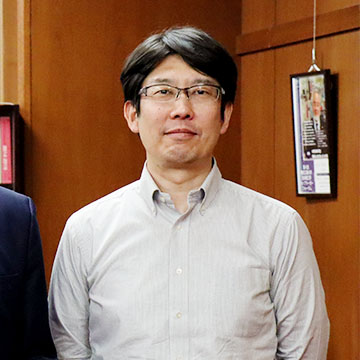
Cell Biology
Takafumi Ueno
Professor
Biography
Takafumi Ueno received his PhD from Osaka University, Japan, in 1998. He held a position as an assistant professor at the Institute for Molecular Science in Okazaki, then Nagoya University. He took a position as an associate professor at Kyoto University. In March 2012, he moved to the Tokyo Institute of Technology as a full professor. His current research interests include design of large protein assemblies and bionanomaterials, and bioinorganic chemistry.
Expectations for WRHI
Establishment of a new research field that Tokyo Tech leads as a hub and international and interdisciplinary network
Research Projects
-
International Collaboration Research Project on Sustainable Functional Protein Materials
Recently, it has been required to develop new sustainable functional materials that can overcome to various environmental aging problems as well as can be applied to next generation fields, such as the space industry. In this project, we focus on proteins that are used as functional materials in various natural systems, and organize interdisciplinary collaboration group aiming for basic understanding and application of functional protein materials with four topics as follows, (1) protein engineering and applications (Nam, Lim), (2) synthesis of artificial proteins (Ueno, Pentelute), (3) high resolution structural analysis (Ueno, Mazumdar), and (4) mathematical biology and molecular dynamics (Lu, Xia). We aim to establish technology of innovative functional biomaterials from WRHI.
1. Protein engineering and applications
Although engineering of various proteins is done, engineering of huge proteins with molecular weights of hundreds of thousands to over several million is still difficult. We focus on the huge basket-like protein structure and aim at the transportation of substances, storage of synthetic molecules and use as nanoreactor by functionalization of them.
2. Synthesis of artificial proteins
In order to design new functions of proteins, introduction of a non-natural site is effective, but there is still a problem in maintaining the selectivity and efficiency of modification and the stability of modified proteins. We will establish new bioconjugation technology using organic synthesis a.
3. High resolution structural analysis
High resolution X - ray crystal structure analysis and cryo-electron microscope have been developed to obtain detailed structural information of large proteins. However, it is still difficult to directly grasp the protein assembly process and the dynamic behavior of large proteins. In this project, we will understand dynamic functions of proteins by various physical chemistry measurements including high speed atomic force microscope and native mass spectrometry.
4. Mathematical biology and molecular dynamic simulation
Simulation of small proteins has been achieved with a time scale which can be experimentally observed, but it is still difficult to understand theoretically large proteins due to requirement of huge computational cost. In this research, we aim to develop simulation methods of large protein using various coarse-grained models and all-atom simulation using Tokyo Tech’s super computer, TSUBAME 3.0.
Protein engineeringBionanomaterialBioinorganic chemistry Supramolecular biomaterial
